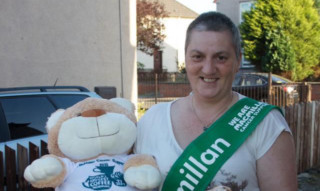A Fife councillor is at the forefront of a national campaign to raise awareness of the disease that killed his wife.
Sharon Graham passed away at the age of 44 last February, after a three-year battle against ovarian cancer.
The wife of Buckhaven, Methil and Wemyss representative David Graham, the mother-of-two had campaigned tirelessly to promote awareness of the condition before it ultimately claimed her life.
A year on from her death, her husband is continuing her work during what has been designated as National Ovarian Cancer Awareness Month.
Councillor Graham said: “Sharon worked tirelessly to promote awareness of this disease to other women,” said.
“As a promise to Sharon, I committed to continuing her work to the best of my ability.
“It is estimated that by 2020 roughly half the population of the United Kingdom can expect to be diagnosed with a form of cancer in their lifetime, so improving outcomes has never been more important.”
Sharon was originally diagnosed with ovarian cancer in 2011. After initially beating the disease by April 2012, there was more heartache to follow, with the cancer returning just three months later.
Mr Graham pledged that he would continue the campaign work carried out by his wife during her treatment and last month put forward a motion to Fife Council, requesting that the local authority do all it can in raising awareness of the disease.
The move was backed unanimously.
“From the time Sharon was diagnosed with this horrible disease to the ultimate end of her life, this has been the hardest challenge of my family’s life to date,” Mr Graham added.
“Sharon was a brave woman, a strong woman with real values and a true grit to help others in their time of need even though she was terminally ill herself and with her own worries.”
More than 4,000 women die every year in the UK as a result of ovarian cancer. With many of the initial symptoms often mistaken or misinterpreted, diagnosis can prove difficult.
Mr Graham added: “One of the biggest reasons why it is so deadly is that the vast majority of women are diagnosed too late, meaning that their chances of survival are extremely poor.
“That contrasts hugely with those who are diagnosed in the very early stages, where up to 90% of patients survive for longer than five years.
“This lack of awareness means women are much less likely to be on the lookout for symptoms themselves, even if they knew what the symptoms were.”
